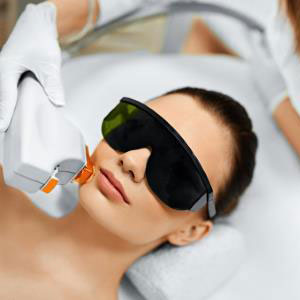Vitiligo, or leukodermia, can affect all skin types, though it is most often noticed in people with darker skin tones. This chronic condition results in the unpredictable loss of pigment in various areas of skin, potentially developing on any part of the body, including the inside of the mouth or even the eyes. It is estimated that 1 to 2 percent of the American population is affected by this condition in which the melanin-producing cells die or cease to function properly. Where melanin is not produced, the skin can have no color. Most instances of vitiligo are diagnosed before the age of twenty.
Symptoms of vitiligo
Vitiligo is recognized by patches of skin in which there is no pigment, or color. Discoloration due to the lack of melanin tends to first develop in areas regularly exposed to the sun, including the lips, face, arms, hands, and feet. Affected skin may appear lighter than surrounding skin, or completely white.
The way in which vitiligo presents vary from person to person:
- Discolored patches may occur only on one side or one part of the body in segmental vitiligo. This type of vitiligo may occur early in life and progress for a few years before it stops.
- Only one or a few areas of the body may be affected by localized, or focal, vitiligo.
- Generalized vitiligo may cause discoloration in many different areas of the body. This type is typically symmetrical. For instance, if one hand becomes affected, so will the other.
We cannot hide our skin. Therefore, though vitiligo is not a serious health condition, many people seek treatment for this condition due to the emotional distress caused by widespread symptoms. There are several treatment options available for vitiligo, most of which have side effects.
Treating Vitiligo by Dr. Roger Koreen

How do you treat Vitiligo?
There is a prescription ointment which is also used in eczema that can be used for vitiligo.
Are lasers for this?
The Extract laser that is used to treat Eczema and Psoriasis that is also used for Vitiligo
Are there good results from this treatment?
It takes a lot of treatment, but people are pretty, happy and you can see very good pigment returning.
You deserve to feel confident in your skin. With personalized treatment from the Dermatology and Cosmetic Laser Center of Huntington, you can. Contact our office at (631) 417-3300.
New hope with the XTRAC® excimer laser
The excimer laser is a safe, effective treatment option for those with vitiligo. Treatment consists of applying a focused beam of intense light to areas of affected skin. The focus of the XTRAC® excimer laser targets specific cells, delivering precise doses of light where needed while leaving surrounding skin unharmed.
Laser therapy for vitiligo should be performed two times a week. The ideal treatment plan may consist of six to twelve treatments, but some may require more to achieve optimal repigmentation. Because this treatment does not involve medicated creams or prescription drugs, laser vitiligo therapy is safe for patients of all ages and even for pregnant women.
You deserve to feel confident in your skin. With personalized treatment from the Dermatology and Cosmetic Laser Center of Huntington, you can. Contact our office at (631) 417-3300.













